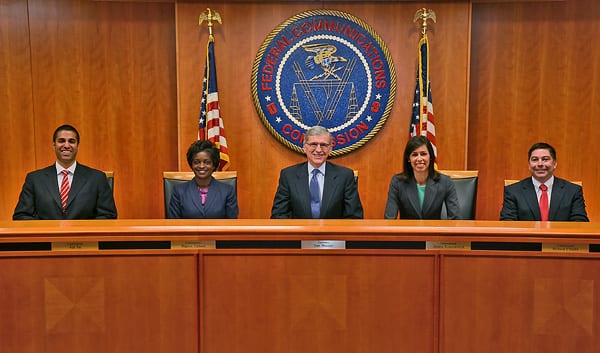
FCC Plays Favorites Setting Rules for Spectrum Auction
Taxpayers Protection Alliance
May 20, 2014

FCC Commissioners (L-R: Ajit Pai, Mignon Clyburn, Chairman Tom Wheeler,
Jessica Rosenworcel & Michael O’Rielly)
Last week, the Federal Communications Commission (FCC) held an open meeting and made news by voting to move forward on a proposal for Net Neutrality that opens the door to a government-regulated Internet. The proposed rules risk harming innovation and incentives that have helped the web thrive for nearly two decades. Unfortunately, the new proposal on regulating the Internet wasn’t the only poor decision to come out of the FCC’s open meeting last Thursday. The rules for the upcoming spectrum incentive auction were voted on, and in another 3-2 decision the vote could not have been worse for those hoping the FCC would take a free-market approach regarding the auction because the FCC limited who could bid for what spectrum. Any spectrum auction should be open to all who want to bid and the spectrum should go to the highest bidder so taxpayers can reap the biggest benefit from the sale.
The Taxpayers Protection Alliance (TPA) has been examining the issue of wireless spectrum for some time. The underlying fact about spectrum is that the government owns most of the wireless spectrum that is available right now, and they really don’t need to have as much as they do for public safety and emergency purposes. TPA has always recognized the role that the FCC and the Congress must play when it comes to wireless spectrum and how it would be best made available to consumers in order to service wireless customers better, encourage growth in business, and ultimately benefit taxpayers when the spectrum is sold in auction. Just last month, TPA submitted a comment to the House Energy & Commerce Committee discussing these very concerns:
TPA believes that the best way to achieve this is to make more spectrum available through auctions. The last auction was held in February 2012 and the next is on hold for now. The auction process should proceed as soon as possible and it should be open for all to participate in without any preferential treatment to pick or choose winners in the bidding. Experts estimate that, over the next decade, spectrum auctions will net the U.S. Treasury at least $20 billion in revenue. We simply cannot ignore the positive impact that an open-auction process would have on the economy. The open-auction process is the best route to take if the FCC wants to encourage more commercially available spectrum and they should reject any calls for a restrictive auction process that hinders participation by any interested party.
The parameters of the auction were laid out by Gigaom’s Kevin Fitchard:
As for the auction itself, I went into detail about its complexities in an earlier post, but here are the basics: TV stations can opt to sell off their broadcast channels, naming their own prices in a reverse auction, and choose either to go off air or share channels with other broadcasters. The FCC will repackage those frequencies into licenses usable for cellular services and auction them to the highest bidder in a forward auction.
Though the auction is moving forward, the FCC has attached rules to the upcoming auction that are in direct conflict to what many groups and organizations supporting free market principles had hoped. The New York Post summed up the results of the vote:
In a 3-to-2 ruling, the FCC said bidders for much of the roughly $20 billion in spectrum coming up for sale cannot have as much spectrum as Verizon or AT&T presently have in most markets, including New York City.
The regulator also defined the parameters of what constitutes currently owned spectrum in such a way as to prevent Sprint, the No. 3 carrier, from participating in some of the auctions, sources said.
The issue of how the FCC would handle the rules for the auction has been something that has sparked attention and controversy even before Mr. Wheeler officially took over as Chairman. Last year, TPA specifically identified the spectrum auction and how Wheeler would handle the guidelines for it as one of the first important decisions he would need to make as head of the FCC. When the DOJ’s attempted to weigh-in on Spectrum auctioning, by authoring an ex-parte submission to the FCC in the Spring of 2013, they called on the commission to “ensure that the allocation of spectrum at auction does not enable carriers with high market shares to foreclose smaller carriers from improving their customers’ coverage.” Clearly, the DOJ wanted to pick winners and losers and sadly it seems that Mr. Wheeler has acquiesced to their demands. There are many who believe otherwise and selectively “rigging” the auction system may do more damage to our economy and the industry in terms of revenue and innovation. Last year a study from Georgetown University authored by Robert J. Shapiro, Douglas Holtz‐Eakin and Coleman Bazelon concluded that such limited participation in the incentive auctions could lead to a decrease in revenues by as much as 40 percent, and an increase the Spectrum deficit.
The open meeting that took place last week was just another part of an early stage in the process for the actual spectrum incentive auction that will take place in 2015. There are many more steps that will be taken in the upcoming months that will impact the actual proceedings, but the rules that were approved last Thursday clearly cut against the ideals of free-market competition and while some have argued the final vote was a “compromise,” it is in fact a clear sign that the FCC wants to at least make some effort to selectively choose who benefits from the incentive auction. TPA will continue to monitor developments in Congress and at the FCC related to the spectrum auction as well as continue to call for the release of more government owned spectrum in a fair and open process.
